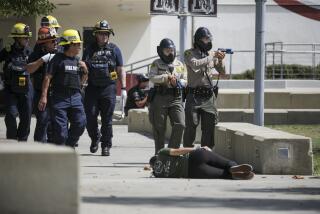POLITICS : Sound Bites Can Be Painful When Policy-Makers, Youths Share Stage : Feinstein, other officials hold ‘round-table’ with students. But media event goes awry when kids follow their own script.
- Share via
WASHINGTON — As some in official Washington have discovered, kids and politics are a potentially disastrous combination--especially when the kids are players in made-for-TV politics.
Sen. Dianne Feinstein (D-Calif.), Rep. George Miller (D-Martinez) and Education Secretary Richard W. Riley met recently with Washington students for an excruciatingly on-the-record “round-table” chat to commemorate the one-year anniversary of the federal Gun-Free Schools Act.
A cornerstone of Feinstein’s 1994 reelection campaign, the act requires states to expel for one year any student who possesses a gun on school property. States failing to do so must forfeit their share of $12.7 billion in federal education aid. Critics of the act complain that it forces schools to turn their backs on children who need help, or that the federal government has no business intruding on school security policies.
All but five states have adopted an acceptable form of the policy, Riley announced last month, and the Education Department expects the others to follow suit soon.
The round-table session was held at a magnet school in a southeast Washington neighborhood that has seen better days. It featured nine demographically correct students. Six were girls and three were boys. Six were African American, one was Latino, one Asian and one white.
With television cameras circling, the students were supposed to give testimonials about their experiences with guns in schools--in effect endorsing the act as an effective way to keep students safe and learning.
At first, they appeared to have no trouble obliging. When Riley asked, “Does the sound of gun shots outside your classroom affect your concentration in school?” no one snickered.
Instead, they dutifully recounted horrifying stories of instances in which firearms did in fact make studying difficult.
A nervous Carl Dubose, 14, admitted that “if you hear gun shots, and a teacher gives a pop quiz, you might put the wrong answers and it’s not exactly your fault.”
Brushing her bangs out of her eyes, eighth-grader Audrey Shiu acknowledged that her fear about a classmate with a gun in his desk had temporarily turned her mind from scholarly pursuits.
But just as the congressional and Education Department aides started to relax, the dialogue took an unexpected turn.
As obvious questions begat obvious answers, the children appeared to grow confused, worried that they somehow were missing the point.
One told the secretary that gun shots in fact did not disturb her concentration.
“Nothing is going to distract me from my education,” 13-year-old Lasha Shorter said proudly. The other students looked relieved. Surely this was the right answer?
Riley changed the question: “What would you think of a law that said that anybody who brings a gun to school can’t come back for a year? Do you think that would be a good law?”
“No,” the children said.
The aides sat up in their seats. The officials looked alarmed.
The students thoughtfully outlined their objections.
What would happen to students expelled? they asked. “I think they need counseling,” one girl said. “You need to find out why they had a gun at school.”
Many people bring guns to school because they are afraid of others, they pointed out. They related stories about themselves, their sisters, brothers and friends--real people who are troubled and scared. People whose decisions to carry guns did not seem unequivocally evil or completely unreasonable.
What about kids for whom school is the last hope?
“If you bring a gun to school, I don’t think you don’t want to be there,” another girl pointed out. Those kids need institutional help, she added.
Don’t the expelled students deserve an education? others asked.
Feinstein interrupted, pointing out that new measures included provisions to provide education for troubled kids through alternative schools.
But her answer was different when asked in July 1994--upon announcing her intention to propose the legislation--what would happen to expelled kids.
“If you bring a gun to school, you’re probably not going to learn anything anyway,” she said then.
But this day, opposing counseling and education for kids who could be the brothers or sisters or friends of the nine who sat before her might have been a difficult position to defend.
Instead, she abandoned the question-and-answer format, opting for a short speech. “When I grew up there weren’t guns at schools,” she said. “No one ever thought about bringing guns to school. The question is, can we go back to those days?”
The speeches signaled the event was ending--and everyone looked relieved.
More to Read
Get the L.A. Times Politics newsletter
Deeply reported insights into legislation, politics and policy from Sacramento, Washington and beyond. In your inbox twice per week.
You may occasionally receive promotional content from the Los Angeles Times.










